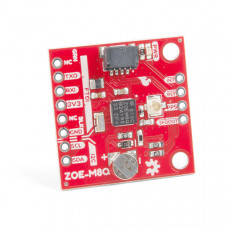SparkFun GPS Breakout - ZOE-M8Q (Qwiic)
Description
The SparkFun ZOE-M8Q GPS Breakout is a high accuracy, miniaturized, GPS board that is perfect for applications that don't possess a lot of space. The on-board ZOE-M8Q is a 72-channel GNSS receiver, meaning it can receive signals from the GPS, GLONASS, BeiDou, and Galileo constellations. This increases precision and decreases lock time and thanks to the onboard rechargable battery you'll have backup power enabling the GPS to get a hot lock within seconds! Additionally, this u-blox receiver supports I2C (u-blox calls this Display Data Channel) which made it perfect for the Qwiic compatibility so we don't have to use up our precious UART ports. Utilizing our handy Qwiic system, no soldering is required to connect it to the rest of your system. However, we still have broken out 0.1"-spaced pins in case you prefer to use a breadboard.
U-blox based GPS products are configurable using the popular, but dense, windows program called u-center. Plenty of different functions can be configured on the ZOE-M8Q: baud rates, update rates, geofencing, spoofing detection, external interrupts, SBAS/D-GPS, etc. All of this can be done within the SparkFun Arduino Library. We've also made sure to configure the UART pin grouping on the breakout to an industry standard to insure that it easily connects to a Serial Basic.
The SparkFun SAM-M8Q GPS Breakout is also equipped with an on-board rechargeable battery that provides power to the RTC on the ZOE-M8Q. This reduces the time-to-first fix from a cold start (~30s) to a hot start (~1s). The battery will maintain RTC and GNSS orbit data without being connected to power for up to five hours. Since the ZOE-M8Q is a tiny GPS receiver and to minimize its footprint, we've added a U.FL connector to allow the use of both large standard ceramic antennas as well as very small chip scale antennas.
The SparkFun Qwiic Connect System is an ecosystem of I2C sensors, actuators, shields and cables that make prototyping faster and less prone to error. All Qwiic-enabled boards use a common 1mm pitch, 4-pin JST connector. This reduces the amount of required PCB space, and polarized connections mean you can’t hook it up wrong.
Features
- 72-Channel GNSS Receiver
- 2.5m Horizontal Accuracy
- 18Hz Max Update Rate
- Time-To-First-Fix:
- Cold: 26s
- Hot: 1s
- Max Altitude: 50,000m
- Max G: ≤4
- Max Velocity: 500m/s
- Velocity Accuracy: 0.05m/s
- Heading Accuracy: 0.3 degrees
- Time Pulse Accuracy: 30ns
- 3.3V VCC and I/O
- Current Consumption: ~29mA Tracking GPS+GLONASS
- Software Configurable
- Geofencing
- Odometer
- Spoofing Detection
- External Interrupt
- Pin Control
- Low Power Mode
- Many others!
- Supports NMEA, UBX, and RTCM protocols over UART or I2C interfaces
Documents
- Schematic
- Eagle Files
- Hookup Guide
- Datasheet (ZOE-M8Q)
- Integration Manual (ZOE-M8Q)
- Product Summary
- SparkFun u-blox Arduino Library
- u-center Software
- GitHub Hardware Repo
Enter the code in the box below:







